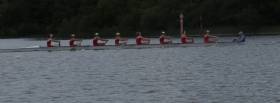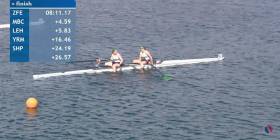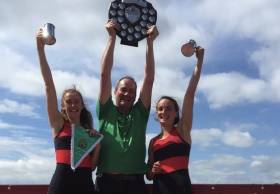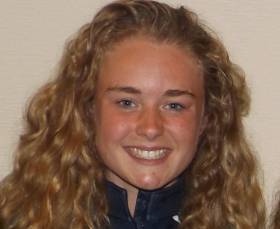Displaying items by tag: Bann
#Rowing: Seven different clubs won in the second session of finals on the second day of the Irish Championships. The races were run in hot sunshine.
Two women's finals senior finals were won in emphatic fashion. Georgia O'Brien of Kenmare won in the women's senior single sculls to give the club its second Championship. NUIG were also well in control in their victory in the women's senior pair.
Sadhbh Scully of Carlow, who is a junior, followed the trend in her big win in the women's club single sculls.
The women's junior 18 eights was a tighter affair, though Bann, once in the lead, held on strongly to rebuff Enniskillen.
The men's junior quadruple was a big event, with Lee taking the title ahead of Three Castles and Neptune.
Cork clubs are having a good Championships, and UCC took the women's club eights.
Skibbereen figured strongly in some finals, but had their first Championship win when Kealan Mannix won the intermediate single sculls from Shane Haugh of Castleconnell.
#Rowing: Bann won the women's junior 18 eights with some style at Athlone Regatta today. In a battle of Northern Ireland clubs, the women in red and white were two lengths ahead of Enniskillen, with Coleraine GS third.
The women's junior 18 fours came late in the day and was a terrific battle. Commercial produced a cracking finish to win by a length from Enniskillen, with Bann third.
Coleraine's Molly Curry was a convincing winner of the women's junior 18 single, while Brian Colsh of Sligo was the men's junior sculling winner.
Galway's St Joseph's won the men's junior 18 eight, while Bann's good day included a win in the men's junior 18 four.
UCD Fours Best at Metro Regatta
#Rowing: UCD fours won on the double at Metro Regatta today. The club in blue and saffron took the Division One men's coxless four in a battle with Commercial, while their coxed four also won. Bann's junior 18 eight were the top women's crew, while the women's quad and coxed four from Commercial also won. Killorglin's Rhiannon O'Donoghue and Anna Tyther, both outstanding juniors, were the fastest double. The men's single saw Kealan Mannix of the University of Limerick take the honours in this 150th anniversary regatta, ahead of Niall Beggan of Commercial. Trinity's Mark Quigley and Adam Browne won the men's pair.
Bann Finish Well at Trinity Regatta
#Rowing: Bann closed out the day with two wins at Trinity Regatta. Aaron Christie won the last race of the day, the men's intermediate single. In the previous race, the Coleraine club's women's club eight beat KSRV Njord convincingly - it made up for the earlier women's junior 18 eight final, in which Bann had crossed first but been disqualified.
The men's club eight went to the hosts, who had taken the day in hand early on by winning the men's senior eight. Their women's club, DULBC had won the novice eight.
Commercial were big winners on the day, racking up victories in the men's senior coxed four and pair and the women's and men's club coxed fours. Michael Maher beat clubmate Niall Beggan in the men's senior single on a disqualification.
Neptune won the men's intermediate coxed four and the women's senior double, while Brian Colsh of Sligo took the men's junior 18 single sculls.
#Rowing: The hosts won the men's senior eights title at Trinity Regatta today. The Trinity/Lady Elizabeth crew had a length and a quarter to spare over Blue Star, a British crew which featured Scott Durant, an Olympic gold medallist, along with former Ireland internationals Cormac Folan and Niall Kenny.
The men's senior singles went to Michael Maher after a disqualification. The race featured a clash between the two Commercial men, after which Niall Beggan was disqualified.
The women's novice eight gave DULBC a chance to show their mettle. They raced Neptune in the final and won well. Bann's women's junior 18 eight looked strong and crossed the line ahead of Graiguenamanagh - but Bann were disqualified for not staying the right side of a buoy.
Brian Colsh of Sligo continued his good run by taking the men's junior 18 single, while Galway beat Blackrock in the men's junior 16 eights final.
Fermoy, Enniskillen and Bann Take Golds, Silver and Bronze at National Schools' Regatta
#Rowing: Irish crews took a full set of medals – gold, silver and bronze – in Championship finals on another excellent day at the British National Schools’ Regatta on Dorney Lake on Sunday. The Fermoy pair of Ellie O’Reilly and Gill McGirr powered away from their opponents in the second half of the Championship Pair A Final, while Enniskillen’s Nathan Timoney and Odhran Donaghy took a comfortable second in the men’s race. Aaron Christie of Bann held out well to hold on to third in the Championship Singles. Enniskillen also took a gold medal in the junior 16 girls’ pair, through Zoe McCutcheon and Maeve Donnelly.
British National Schools’ Regatta, Dorney Lake (Selected Results; Irish interest)
Saturday
Boys
Championship/Non-Championship Eight – B Final: 3 Enniskillen RBC.
Girls
Championship/Non-Championship Eight – B Final: 2 Galway 7:35.72; 3 St Michael’s 7:45.46.
Junior 16 Four, coxed – A Final: 2 Enniskillen RBC 8:22.68.
Sculling, Double – Championship A Final: 2 Workmen’s (A O’Donoghue, C Browne) 8:06.37.
Single – Championship A Final: 7 Workmen’s (C Moynihan) 9:10.40. B Final: 1 Coleraine Grammar School (M Curry) 8:43.03.
Sunday
Boys
Championship Pair: 2 Enniskillen (O Donaghy, N Timoney) 7:19.06.
Sculling, Championship Singles: 3 Bann (A Christie) 7:39.46.
Girls
Championship Pair: 1 Fermoy (E O’Reilly, G McGirr) 8:11.17.
Junior 16 Pair: 1 Enniskillen (M Donnelly, Z McCutcheon) 8:08.80
Early Movers Take Spoils at Irish Rowing Championships
#Rowing: On a morning of clear victories, David Higgins of Presentation Boat Club, Cork, had to battle to see off Luke Hayes-Nally of Shandon to take the Club Singles title at the National Rowing Centre.
The other wins in the Saturday morning session of the Irish Rowing Championships followed the pattern of one crew gaining an early lead and winning well. Mark O’Donovan and Shane O’Driscoll in the pair; NUIG in the women’s novice eight; Enniskillen in the men’s junior coxed four and Cork Boat Club’s Lisa Dilleen and Chloe Mehigan in the women’s intermediate double all came home well clear of the field.
Hannah Scott made her move so early that she had three-quarters of the junior single sculls final as clear leader. Margaret Cremen held off Aoife Casey for second.
The men’s intermediate eight final was a UCD affair – their A crew beat their B crew in a tight finish.
Irish Rowing Championships, Day Two (Selected Results)
Men
Eight – Intermediate: UCD 5:50.02.
Four – Junior, coxed: Enniskillen 6:22.94.
Pair – Senior: Skibbereen 6:59.69.
Sculling, Single – Club: Cork (D Higgins) 7:26.59.
Women
Eight – Novice: NUIG 6:38.95.
Sculling, Double – Intermediate: Cork 7:09.95.
Single – Junior: Bann (H Scott) 7:41.22.
#Rowing: Skibbereen added four titles to their already weighty tally on the first day of the Irish Rowing Championships at the National Rowing Centre today. Paul O’Donovan won the senior single sculls and teamed up with Mark O’Donovan, Shane O’Driscoll and his brother Gary in the senior four – both were done in new record times for the course. Paul and Gary also won the senior doubles. The Skibbereen women’s four also won well, in a new best time for the course.
NUIG also took four titles: the men’s intermediate coxed four and club eight and the women’s club coxed four and novice coxed quadruple.
Cork Boat Club proved best in the women’s intermediate eight and also won perhaps the best race of the day: Barry O’Flynn was severely tested by Jack Dorney in the junior single sculls but fought back after being passed and won by a length.
The Old Collegians victory in the women’s senior double was straightforward: Sanita Puspure and Claire Lambe were by far the best crew.
This was the last final of the day, while UCC had won the first, taking the men’s novice coxed quadruple.
Neptune and St Joseph’s tried to rein them in, but the men’s junior eights final was a surprsingly straightforward affair for winners Enniskillen, who also won the women’s junior four. Lee’s Margaret Cremen and Aoife Lynch were also in control in the women’s junior double, as were Hannah Scott and Katie Shirlow in the intermediate pair.
Irish Rowing Championships, National Rowing Centre, Day One (Selected Results)
Men
Eight – Club: NUIG 5:53.60. Junior: Enniskillen 5:47.96.
Four – Senior: Skibbereen 5:55.33. Inter, coxed: NUIG 6:13.38.
Sculling, Quadruple – Novice, coxed: UCC 6:39.37.
Double – Senior: Skibbereen 7:06.89.
Single – Senior: Skibbereen (P O’Donovan) 6:48.19. Junior: Cork (B O’Flynn) 7:04.06.
Women
Eight – Intermediate: Cork 6:22.06.
Four – Senior: Skibbereen 6:40.58. Club, coxed: NUIG 7:10.92. Junior: Enniskillen 6:57.94.
Pair – Inter: Bann 7:19.32.
Sculling, Quadruple – Novice, coxed: NUIG 7:36.02. Double – Senior: Old Collegians 6:59.997. Junior: Lee 7:09.86.
#Rowing: Barry O’Flynn of Cork Boat Club came from behind to win the junior single sculls title at the Irish Rowing Championships in Cork today. Jack Dorney of Shandon tested the favourite in an exciting race – and went ahead. O’Flynn came back and won by a length.
Two of the top junior women were involved in impressive wins. Hannah Scott teamed up with Katie Shirlow to win the intermediate pairs for Bann, while Margaret Cremen and Aoife Lynch won the junior doubles.
NUIG won two sucessive finals, the women’s club coxed four and the men’s intermediate coxed four, while UCC had started the first session of finals at the Championships with a win in the novice coxed quadruple.
Skibbereen called on the class of their international brigade to also win twice: Paul and Gary O’Donovan were untested in their senior doubles win, while Denise Walsh stroked the women’s senior four to a fine win over UCD.
Irish Rowing Championships, National Rowing Centre, Day One (Selected Results)
Men
Four – Inter, coxed: NUIG 6:13.38.
Sculling, Quadruple – Novice, coxed: UCC 6:39.37.
Double – Senior: Skibbereen 7:06.89.
Single – Junior: Cork (B O’Flynn) 7:04.06.
Women
Four – Senior: Skibbereen 6:40.58. Club, coxed: NUIG 7:10.92.
Pair – Inter: Bann 7:19.32.
Sculling, Double – Junior: Lee 7:09.86.
Big Win For Bann's Hannah Scott
#Rowing: Bann rower Hannah Scott won at the British National Schools’ Regatta at Dorney Lake today. The Coleraine girl won the Championship Girls Single Sculls (The Internationals’ Cup). She is bound for Princeton once she completes her studies in Northern Ireland.

































































